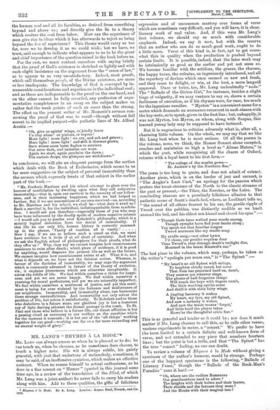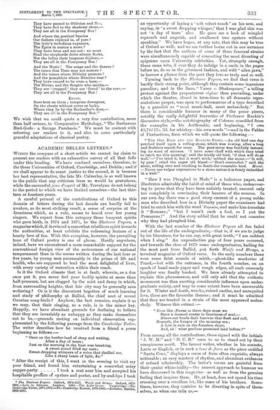MR. LANG'S " RHYMES A LA MODE."*
Mn. LANG can always amuse us when he is pleased so to do ; he can touch us, when he chooses, as he sometimes does choose, to touch a higher note. His wit is always subtle, his gaiety graceful, with just that undertone of melancholy, sometimes, it may be said, of an inoffensive cynicism, which makes an effective contrast. When he rouses himself to actual enthusiasm, as he does in a fine sonnet on " Homer " (quoted in this journal some time ago, in a review of the translation of the Iliad, of which Mr. Lang was a joint-author) he never fails to carry his readers along with him. Add to these qualities, the gifts of felicitous
expression and of uncommon mastery over forms of verse which are sometimes very difficult, and you will have, it is clear, literary work of real value. And, if this were Mr. Lang's first volume, we should say as much with considerable emphasis. Indeed, we say it now, but with the reserve that an author who can do so much good work, ought to do a little more. Verse of this kind is, in fact, apt to get somewhat thin in quality when the production is pushed beyond certain limits. It is possible, indeed, that the later work may be intrinsically as good as the earlier and yet not seem so. We become familiar with the artifices, the graces, the charms, the happy turns, the refrains, so ingeniously introduced, and all the repertory of devices which once seemed so new and fresh, and they cease to delight, or win, at the best, a more languid approval. Once or twice, too, Mr. Lang undoubtedly " nods." The "Ballade of the Girton Girl," for instance, besides a slight tinge of vulgarity, if we may venture to say so, shows a certain feebleness of execution, as if his rhymes were, for once, too much for the ingenious versifier. " Myrton " is a convenient name for a metre which demands an assonance recurrent in each stanza with the key-note, so to speak, given in the first line ; but, unhappily, it was not Myrton, but Myron, on whom, along with Scopas, this learned young lady may be supposed to have lectured.
But it is ungracious to criticise adversely what is, after all, a charming little volume. On the whole, we may say that we like Mr. Lang best when he is most serious; Of all the poems in the volume, none, we think, the Homer Sonnet alone excepted, reaches and maintains so high a level as " Almae Matres," in which the poet, while recognising all the charm of Oxford, returns with a loyal heart to his first love,
' " The college of the scarlet gown—
St. Andrew's by the Northern Sea."
The poem is too long to quote, and does not admit of extract. Another piece, which is on the border of jest and earnest, is "The Angler's Last Cast," an apology for the passion which prefers the trout.streams of the North to the classic streams of the past or present,—the Tiber, the Eurotas, or the Loire. The concluding stanzas are a peculiarly felicitous allusion to that pathetic scene of Scott's death-bed, where, as Lockhart tells us, "the sound of all others dearest to his ear, the gentle ripple of Tweed over the pebbles, was distinctly audible as we knelt around the bed, and his eldest son kissed and closed his eyes " :—
" Though Gods have walked your woods among,
Though nymphs have fled your banks along ; You speak not that familiar tongue Tweed murmurs like my cradle song.
My cradle song,—nor other hymn I'd chose, nor gentler requiem dear
Than Tweed's, that through death's twilight dim, Mourned in the latest Minstrel's ear." : "My heart's an old Spinet with strings, To laughter chiefly tuned, but some That Fate has practised hard on, dumb,
They answer not whoever sings.
The ghosts of half-forgotten things Will touch the keys with fingers numb, The little mocking spirits come And thrill it with their fairy wings.
A jingling harmony it makes My heart, my lyre, my old Spinet, And now a memory it wakes, And now the music means forget,' And little heed the player takes Howe'er the thoughtful critic fret."
This is as graceful and tender as it could be ; nor does it much matter if Mr. Lang chooses to call this, as he calls other verses, various experiments in metre, a "sonnet" We prefer to have the term limited to a certain definite and well-known form of verse, and not extended to any piece that numbers fourteen lines ; but the point is but a trifle, and that "The Spinet" has the true " sonnet " feeling, no one can doubt.
To review a volume of Rhymes a la Mode without giving a specimen of the author's humour, would be strange. Perhaps one of the happiest specimens is the following, " Ballade of Literary Fame," though the " Ballade of the Book-Man's
Paradise" runs it bard :
" Oh, where are the endless Romances Our grandmothers used to adore ? The knights with their helms and their lances, Their shields and the favours they wore ? And the Monks with their magical lore ? They have passed to Oblivion and Nor, They have fled to the shadowy shore,— They are all in the Fourpenny Box !
And where the poetical fancies Our fathers rejoiced in, of yore ? The lyric's melodious expanses, The Epics in cantos a score ?
They have been and are not : no more Shall the shepherds drive silvery flocks, Nor the ladies their languors deplore,— They are all in the Fourpenny Box !
And the Music ! The songs and the dances ?
The tunes that Timo may not restore ?
And the tomes where Divinity prances ?
And the pamphlets where Heretics roar ?
They have ceased to be even a bore,— The Divine, and the Sceptic who mocks,— They are cropped,' they are ' foxed' to the core,—
They are all in the Fourpenny Box !
ENVOY.
Suns beat on them ; tempests downpour, On the chests without cover or locks, Where they lie by the Bookseller's door,— They are all in the Fourpenny Box !"
We wish that we could quote a very fine contribution, more than half serious, to Comparative Mythology, " The Barbarous Bird-Gods : a Savage Parabasis." We must be content with referring our readers to it, and also to some particularly graceful adaptations of classical poetry.















































 Previous page
Previous page